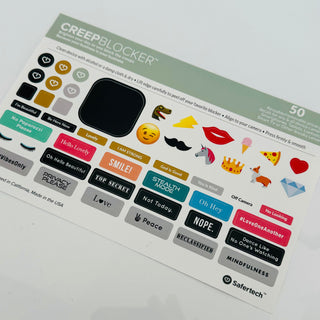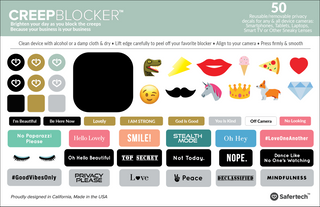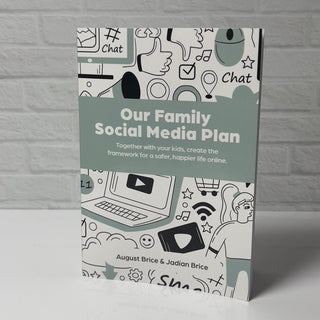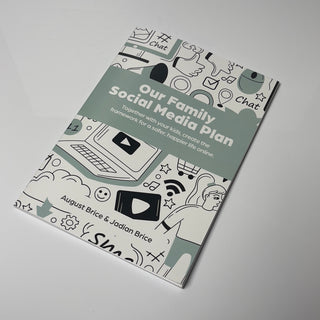It's like swatting at a fly. Those weird emails and texts fly through your inbox and IF you can find the energy, you delete them-or maybe you just ignore them. But it's so easy to click an irresistible link or innocently respond to someone you THINK you might know. And at that point, it's probably already too late. Phishing is still the door opener for most financial scams and hacking in the U.S. Keeping that top of mind and making sure your kids do too, is important to your safety and security today.
This an important topic to us. Helping you and your family stay safe and thrive in our digital world is our mission at Tech Wellness--and it's a BIG mission.
There's so much to consider--especially if you have kids. That's why you'll find articles and videos about how technology and the way we use our screens can effect your health your safety, your privacy and your mental wellness.
We talk about avoiding tech toxins like blue light and EMF - and when tech gets toxic because of a cybersecurity breach or because we get addicted to looking at our social feeds. That 3.4 billion spam or phishing emails sent daily statistic came from AAG-it.com, the cybersecurity and IT management firm. They also shared:
- Over a fifth of phishing emails originate from Russia.
- Millennials and Gen-Z internet users are most likely to fall victim to phishing attacks.
Here's a great example of a Phishing Text! Here's How To Tell It's Not Real
- The URL: Bay Area FasTrak's payment link would be this: /www.bayareafastrak.org/en/home/ways-to-pay Notice the difference in the URL's the "-etcfw.world/us" is a good indication that it's fishy
- We don't live in the Bay Area
- We haven't visited the Bay Area recently
- A real link wouldn't ask you to reply and cut an past a link into Safari

Phishing is just plain toxic. Some people tell me they get dozens a day.
Phishing Goes By Many Names
- Catfishing mainly applies to fake people or real people who say fake things about themselves in order to get something from you
- Smishing is the abbreviation for short messaging texts that we are seeing far too much of lately in or texts. The idea is to get your personal info as you click on them and go to a "fake site"
- Phishing through websites that are actually just lists of Affiliate Links but disguised as "Best Of" or "Top Product" reviews
- Search Engine Phishing is where a search engine will actually direct you to what looks like a real loan or bank site and you might enter in lots of personal information thinking you're applying for an account or a loan
- Links to Fake websites. Hackers will send out emails or texts or direct messages-even on or through social media accounts in order to get someone to click on them.
- Trojan or Malware phishing looks like a legitimate link, but once you've clicked on it, it can download malware onto your computer that can actually allows unauthorized access to the user account to collect credentials through the local machine. The acquired information is then transmitted to cybercriminals.
-
SpeaSpear Phishing--this information comes from Phishing.org
It says to think of this one as professional phishing. It's targeted to certain individuals or an entire company to compromise the person or company. They research the target and apparently are in search of information more valuable the credit cards and make the attack as targeted and personal as possible.
So, Let's Not Be Victims: Here Are The Seven Things You Can Do To Help Keep Catfishers , Phishing Fake Personas Out Of Your Life.
1.Pause Before You Push That Button or Click That Link! No matter what, if it's an email or text or DM that even comes with a what looks like a web link- Think about it first. Ask yourself, "What if this is a fake link, what do I have to lose?" Then if it's still intriguing and you want to click so bad- do these things:
2. Search The Link or The Company or Person Before You Click Businesses and the people who founded them or run them are usually proud to tell you details about their backgrounds. Professionals will provide their college and career backgrounds on LinkedIn or even on Facebook. Contests or Offers of Freebies that claim to be part of a brand or website will be featured on that site. So check the site and see if you find the great deal or Free Offer or contest or sweepstakes there.
3. Check all social channels as well for more information and back up on the person or business credibility. The older they are the more likely you are to find out about them. Even if it's just from Facebook and other social accounts, if they've been out there a while you can start to see if the words, pictures and stories match. When you meet someone new online, notice how many different photos they have. The more the better. The photos should reflect different situations and life periods and be candid, with others sometimes and it would be helpful if they "matched" their "story" meaning their town, their job, their family.
4. Don't want to be catfished or phished by an great photo only to find out that that person is AI or not real? Google Image or Reverse Image Search them. What an image reveals can be very informative and help you decide if you want to continue contacting or following them. That's actually how I discovered EMF Academy's "founder" was just a fake photo of a man who did not give permission to use his picture! Once you see a company is representing themselves as something they're not, put your guard up and trust-radar in action. Btw, after 8 years of using several fake persona's apparently the "real" owner of EMF Academy came out. Hmmmm.
5. Watch Out For Pop Ups. These are tricky because you can be on a valid, real website and a Pop-Up will come on and also look legit, but it can actually be a Phishing scheme. Many browsers allow you to block Pop Up's but sometimes a site won't work unless you have pop-ups enabled. What to do? Always disable them and only enable when the site requests or requires it.
6.Check the URL. Sometimes it's really easy to spot Phishing, especially if the link let's you see a URL or takes you to a URL. Think your going to ATT or BankofAmerica or Chase Bank? The final end of the URL will have Chase.com Or bankofamerica.com or ATT.com If it's a fake it might have a URL like this: Bankofamerica.thisisthat.com or something random.
7. Don't open any email or download anything from an email unless you're sure of the source. Sadly that goes for attachments and photos too. They can have links embedded to do malicious
8. Reply to the text or email or DM and ask that they email you the offer or the bill or the voting ballot for the contest. Make sure you have an "alias" email specifically for junk, just in case it is. Tell them to make sure it's an inline attachment or a photo that you can see. If it's not a pressing issue like the "bill" from FasTrak shown above, ask them to send you a letter--to your PO box of course.
9. Try a really Private email service that even has a Hide-my-email aliases service built right in and erases spam before you even have to see it. For private and secure email,I LOVE my fully encrypted email based in Switzerland for IOS, Android, and computers: Proton Mail I have been using it for 8 years now.
10. Stop giving everyone who asks you, your phone number! This is you great hack for keeping spammy texts or Phishing or just plaint too many texts out of your in-box. Think about it, does that shoe store or dentist's office or UPS really need your mobile phone? I don't give out mine often and I receive VERY few phishing or spam texts. You may have seen I did get a text from my carrier- ATT recently telling me that there was a NEW Tower going up in Dallas- whohooo, I got to reply and tell them all about EMF. Even if a real human never saw it, it felt good to explain why we didn't need another tower in a city and state with way too much coverage.
More About Catfishers (Catfishers, Phishers, and Scammers: Who’s Really on the Other Side?)
Catfishers are fake online personas and easily published untruths that have sprung up because, well, the internet makes it easy to say you’re someone you’re not and for the most part, there’s nothing out there stopping it.
You’ve probably heard of Cat-fishing. It may have even happened to you. Someone pretends to be someone else. Usually they use a made-up name, and a made-up life, along with a made-up or “stock” photo that convinces you they are someone they’re not.
Their goal is to get something— — and it could be cash or your trust, your heart or any number of other things, that will benefit the catfisher and hurt you.
Here are some statistics collected by Screen and Reveal, a background check company:
Men are statistically more likely than women to catfish. Facebook has taken down 1.3 billion fake accounts in just six months.
Catfisher's cite loneliness as the biggest motivation for creating fake personas.
Social media platforms have produced more romance scams than online dating sites.
Romance scam incidents rose by 40% in 2020 amid the Coronavirus pandemic.
But did you know that we can also get “Catfished” by an online business or by books or informational sites?
How A Business or Book Can Catfish
“How an industry of ‘Amazon entrepreneurs’ pulled off the Internet’s craftiest catfishing scheme.” This was the title of an article about how book authors would make up fake names, fake degrees and career paths in order to sell books with catchy topics and titles online. They tell a story of just one of many authors with fake names — one of which wrote a pretty unimpressive language book called Learn Spanish in 7 Days that sold well because she called herself a Polygot and Professional Language teacher. Turns out she wasn’t a teacher at all.
The rough part of being a Catfish victim is you don’t get what you wanted or paid for. You can get bad or misleading information from a business, or you might get something that just isn’t close to 100% real. You’re motivated to buy, thinking the seller is something that it turns out that they’re not.
Even if pretending you’re someone other than who you really are for a “good” reason, when people who believe you are real and trustworthy, find out you’re not, they call themselves ‘victims.”
Phishing Scams
Along a similar vein, “phishing” is the faceless relative of catfishing and is the most common type of online scam you need your kids to know about so they can steer clear. Phishing comes to them looking like a message, but it’s really just a carrier for a malicious link that the phisher wants them to click. That link could take them to a website that looks real and legit but actually wants personal information and a credit card number or wants to download your login information or download malware on your family computer.
I often get emails and texts that say they’re Google, Fedx, UPS, The TollRoad, Facebook that tell me they need money or my address or that they want me to confirm my address. Kids will get messages from “sites” that appeal to them or that are impersonating trusted organizations like a bank or credit card company.
There are the Catfishers: Fake online personas and easily published untruths that have sprung up because, well, the internet makes it easy and for the most part, there's nothing out there stopping it.
You've probably heard of Catfishing. It's when someone pretends to be someone else. Usually a made-up name, a made-up life, along with a made up or "stock" photo that Catfishers use to convince you that they are someone they're not. Their goal is to get something--and it could be cash or your trust or any number of other things, that will benefit the Catfisher and hurt you.
We typically think about it in the online dating world because of that series called Catfished where various victims and Catfishers would be discovered and confronted.
But did you know that we can get "Catfished" by an online business or by books or informational sites?
The Washington Post did this story a few years ago,
"How an industry of ‘Amazon entrepreneurs’ pulled off the Internet’s craftiest catfishing scheme"

about how book authors would make up fake names, fake degrees and career paths in order to sell books with catchy topics and titles online. They tell a story of just one of many authors with fake names - one of which wrote a pretty unimpressive language book called Learn Spanish in 7 Days that sold well because she called herself an Polygot and Professional Language teacher.
The rough part of being a Catfish victim is you don't get what you wanted or paid for; you can get bad or misleading information from a business; you get something that isn't close to 100% real: you get something fake.
And that's why we've made the list above to help you avoid fake personas or Catfish.
We all deserve to get credible information from a credible source when we need it. Especially when it comes to our well-being.
This is me, August Brice- in my laundry room showing you how to find hidden sources of EMF Radiation in Smart Appliances. You can find me on TikTok, Instagram, Facebook, Pinterest and LinkedIn--just in case you're trying to verify I'm the real deal :)
Even if pretending you're someone other than who you really are for a "good" reason, when people who believe you are real and trustworthy, find out you're not, they call themselves 'victims."
A Special Note to You- Who Do WE Look Up To And Trust?
Sometimes it's hard to know what to believe online. To be your trusted resource we consult with some of the world's foremost experts on tech toxins like EMF. Our understanding of man made electromagnetic radio waves continues to evolve. I encourage you to rely on websites and resources that are informed by trusted scientists and doctors. Dr. George Carlo who led the seminal research study for the wireless industry(his book is featured in our store) and President of the Board of Directors of the International Association of Building Biologists, Larry Gust are the two foremost experts I look to.
I also recommend the work of Joel Moskowitz and his site: SafeEMR, Americans For Responsible Technology is a great resource for tools to help battle you contact the people in your state and city's that make the laws allowing for more and more wireless antenna's and yes, 5g. There's the often quoted Bioinitiative Report and now Physicians for Safe Technology, Dr. Olle Johansson and the amazing Devra Davis and the entire team at The Environmental Health Trust and Ellie Marks and The California Brain Tumor Association whose mission is to safeguard public health These people highly regarded experts when it comes to the science of Electromagnetic Radiation. Looking for Certified EMF Education? If you're serious, enroll in the Building Biology Institute
Prepare to spend 400 plus hours learning about all manner of environmental toxins and an additional 120 hours to reach the gold standard of EMRS
Check the background of the people involved in creating the information you're using to make decisions regarding EMF and your health and make sure they're the real deal. There are some great authentic and accurate EMF sites, like emfanalysis. It's run by Jeromy Johnson and we have similar backgrounds. There seems to be a lot of interest lately in the topic I've been concerned about for 25 years and though I'm very happy and relieved that so many are now taking this topic seriously--and I'm happy some EMF resources embed Safertech and Tech Wellness videos in their sites- I'm concerned that you, (if you're concerned about wireless radiation and your health) steer clear of "experts" who may be trying to promote items that really don't do what they claim or entice you to visit their sites so they can sell ads based on high traffic or affiliate with unproven "emf protection".
It is a confusing and sometimes scary topic--I keep my earlier videos from 2007 on this site so you can see that my understanding has grown deeply. Please know that I take great pride in not creating fear or misunderstanding in this space and it's my deep desire for you to be healthy and well and live life in balance and safety with technology










